- Home
- Fredric Brown
The Second Fredric Brown Megapack: 27 Classic Science Fiction Stories Page 20
The Second Fredric Brown Megapack: 27 Classic Science Fiction Stories Read online
Page 20
Just inside he waited. And waited.
His eyelids grew heavy and dropped. And he slept, deeply.
A touch awakened him, and Mitkey jumped. Then he saw it was Whitey. “Shh,” said the white mouse, “der brofessor is asleep. It iss almost dawn, und he has his alarm glock set to go off in an hour yet. Then he vill find I am gone. He may try to catch a mouse to use instead, so ve must hide und not go outside.”
Mitkev nodded, “Smart you iss, Vhitey. But mine Minnie! She iss—”
“Iss nothing ve can do, Mitkey. Vait, before ve hide, show me der X-19 und how it vorks.”
“I show you quick, und then I hunt Minnie before der brofessor vakes. It iss here.”
And Mitkey showed him.
“Und how vould you reduce der power, Mitkey, so it vould not make a mouse quite so indelligent as ve are?”
“Like this,” said Mitkey. “But vhy?”
Whitey shrugged. “I chust vondered. Mitkey, der brofessor gafe me a very sbecial kind of cheese. Something new, und I brought you a liddle piece to try. Eadt it, und then I vill help you find Minnie. Ve haff almost an hour yet.” Mitkey tasted the cheese. “Iss nodt new. Iss Limburger. But hass a very vunny taste, effen for Limburger.”
“Vhich do you like bedder?”
“I dont know, Vhitey. I think I do nodt like—”
“Iss an acquired taste, Mitkey. Iss vonderful. Eadt it all, und you vill like it.”
So to be polite and to avoid an argument, Mitkey ate the rest of it.
“Iss nodt bad,” he said. “Und now ve look for Minnie.”
But his eyes were heavy, and he yawned. He got as far as the edge of the mousehole.
“Vhitey, I must rest a minute. Vill you vake me in aboudt fife min—”
But he was asleep, sound asleep, sounder asleep than he had ever been, before he finished the sentence.
Whitey grinned, and became a very busy little mouse.
* * * *
The ringing of an alarm clock.
Professor Oberburger opened his eyes sleepily and then remembered the occasion, and got hastily out of bed. Within half an hour now, the time.
He went out behind the house and inspected the firing rack. It was in order, and so was the rocket. Except, of course, that the compartment door was open. No use to put the mouse in until the last moment.
He went indoors again, and carried the rocket out to the rack. Fitted it very carefully into place, and inspected the starter pin. All in order.
Ten minutes. Better get the mouse.
The white mouse was sound asleep in the wooden cage.
Professor Oberburger reached into the cage carefully. “Ach, Vhitey. Now for your long, long chourney. Boor liddle mouse, I vill not avaken you if I can help. More bedder you should sleep until der cholt of der stardt avakens you.”
Gently, very gently, he carried his sleeping burden out into the yard and put it in the compartment.
Three doors closed. First the inner one, then the balsa grating, then the outer one. All but the balsa grating would open automatically when the rocket landed. And the radio pick-up would broadcast the sound of the mouse chewing its way through the balsa.
If there was atmosphere on the moon. If the mouse—
Eyes on the minute-hand of his watch, the professor waited. Then the second-hand. Now—
His finger touched the accurately-timed delayed-action starter button, and then he ran into the house.
WHOOOSH!
Trail of fire into the air where the rocket had been.
“Gootbye, Vhitey. Boor liddle mouse, but someday you vill be vamous. Almost as vamous as mine star-mouse Mitkey vill be, some day vhen I can bublish—”
Now for the diary entry of the departure.
The professor reached for his pen, and as he did so caught a glimpse of the inside of his hand, the hand that held the mouse.
White it was. Perplexed, he studied it closer under the light.
“Vhite paint. Vhere vould I haff picked up vhite paint? I haff some, but I haff not used it. Nothing on der rocket, nothing in der room or der yard—”
“Der mouse? Vhitey? I held him so. But vhy vould der laboratories send me a mouse painted vhite? I tole them any color vould do—”
Then the professor shrugged, and went to wash his hands. It was puzzling, very puzzling, but it did not matter really. But why on Earth would the laboratories have done that?
* * * *
But in the black compartment of the roaring, soaring rocket. Moon-bound and bust.
Doped Limburger cheese.
Black treachery.
White paint.
Alas, poor Mitkey! Moonward-bound, without a ticket back.
* * * *
Night, and it had been raining in Hartford. The professor hadn’t been able to follow the rocket through his telescope.
But it was up there all right, and going strong.
The radio pick-up told him that. Roar of the jets, so loud he couldn’t tell whether or not the mouse inside was alive or not. But it probably was, hadn’t Mitkey survived on the trip to Prxl?
Finally, he turned off the lights to take a cat-nap in his chair. When he awoke, maybe the rain would have stopped.
His head nodded, his eyes closed. And after a while, he dreamed that he opened them again. He knew he was dreaming because of what he saw.
Four little white spots moving across the floor from the door.
Four little white spots that might have been mice, but couldn’t be—unless they were dream mice—because they moved with military precision, in an exact rectangle. Almost like soldiers.
And then a sound, too faint for him to distinguish, and the four white spots abruptly fell into a single file and disappeared, one by one at precise intervals, against the baseboard.
The professor woke, and chuckled to himself.
“Vot a dream! I go to sleep thinking of der vhite mouse und vhite paint on mein hands und I dream—”
He stretched and yawned, and stood up.
But a small white spot, a white something had just appeared at the baseboard of the room again. Another joined it. The professor blinked his eyes and watched them. Could he be dreaming, standing up?
A scraping sound, something being shoved across the floor, and as the first two white spots moved away from the wall, two more appeared. Again in rectangular formation, they started across the floor toward the door.
And the scraping continued. Almost as though the four—could they be white mice?—were moving something, two of them pulling it and two pushing.
But that was silly.
He reached out beside him for the switch of the light, and clicked it. The light momentarily blinded him.
“Stobp!” High and shrill and commanding.
The professor could see again now, and it was four white mice. They had been moving something, a strange little object fashioned around what looked like one of the cells of his own pencil-type flashlight.
And three of the mice were now doing the moving, frantically, and the fourth had stepped between him and the strange object. It pointed what seemed to be a small tube at the professor’s face.
“If you moofe, I gill you,” shrilled the mouse with the tube.
It wasn’t completely the threat of the tube that kept the professor motionless. He was simply too surprised to move. Was the mouse with the tube Whitey? Looked like him, but then they all looked like Whitey, and anyway Whitey was on his way to the moon.
“But vot—who—vhy—?”
The three mice with the burden were even now vanishing through the hole in the screen door. The fourth mouse backed after them.
Just inside the screen door, he paused.
“You are a vool, Brofessor,” he said. “All men are vools. Ve mice vill take care uf that.”
And it dropped the tube and vanished through the hole.
Slowly the professor walked over and picked up the weapon the white mouse had dropped. It was a match-stick. Not a tube or a weap
on at all, just a burned safety match.
The professor said, “But how—vhy—?”
He dropped the match as though it were hot, and took out a big handkerchief to mop his forehead.
“But how—und vhy—?”
He stood there what seemed to be a long time, and then slowly he went to the icebox and opened it. Back in a far corner of it was a bottle.
The professor was practically a teetotaler, but there comes a time when even a teetotaler needs a drink. This was it.
He poured a stiff one.
* * * *
Night, and it was raining in Hartford.
Old Mike Cleary, watchman for the Hartford Laboratories, was taking a drink, too. In weather like this, a man with rheumatism in his bones needed a drink to warm his insides after that walk across the yard in the rain.
“A foine night, for ducks,” he said, and because that drink had not been the first, he chuckled at his own wit.
He went on into building number three, through the chemical stockroom, the meter room, the shipping room. His lantern, swinging at his side, sent grotesque shadows before him.
But these shadows didn’t frighten Mike Cleary; he’d chased them through this building for nights of ten years now.
He opened the door of the live-stock room to look in, and then left it wide behind him and went on in. “Begorra,” he said, “and how did that happen?”
For the doors of two of the large cages of white mice were open, wide open. They hadn’t been open when he’d made his last round two hours before.
Holding his lantern high, he looked into the cages. They were both empty. Not a mouse in either.
Mike Cleary sighed. They’d blame him for this, of course.
Well, and let them. A few white mice weren’t worth much, even if they took it out of his salary. Sure, let them take it out if they thought it was his fault.
“Misther Williams,” he’d tell the boss, “those doors were closed when I went by the first time, and open when I went by the second, and I say the catches on them were worthless and dee-fective, but if you want to blame me, sorr, then just deduct the value of the—”
A faint sound behind him made him whirl around.
There in a corner of the room was a white mouse, or what looked like a white mouse. But it wore a shirt and trousers, and—
“Ye Gods,” said Mike Cleary, and he said it almost reverendy. “Is it the D.T.’s that I’m—”
And another thought struck him. “Or can it be, sorr, that you are one of the little folk, please, sorr?”
And he swept off his hat with a trembling hand.
“Nudts!” said the white mouse. And, like a streak, it was gone.
There was sweat on Mike Cleary’s forehead, and sweat trickling down his back and under his armpits.
“Got them,” he said. “Oi’ve got them!”
And quite illogically, since that was now his firm belief, he took the pint bottle from his hip pocket and finished the rest of its contents at a single gulp.
* * * *
Darkness, and roaring.
And it was the sudden cessation of the roaring sound that wakened Mitkey. Wakened him to utter and stygian blackness of a confined space. His head ached and his stomach ached.
And then, suddenly, he knew where he was. The rocket!
The jets had stopped firing, and that meant he was over the line and falling, falling toward the moon.
But how—? Why—?
He remembered the radio pick-up that would be broadcasting sounds from the rocket to the professor’s ultra-short-wave receiver, and he called out despairingly, “Brofessor! Brofessor Oberburger! Help! It iss—”
And then another sound drowned him out.
A whistling sound, a high shrill sound that could only be the rush of the rocket through air, through an atmosphere.
The moon? Was the professor right and the astronomers wrong about the moon, or was the rocket falling back to Earth?
At any rate, the vanes were gripping now, and the rocket was slowing rather than accelerating.
A sudden jerk almost knocked the breath out of him. The parachute vanes were opening now. If they would—
Crash!
And again blackness behind the eyes of Mitkey as well as before them. Blackout in blackness, and when two doors clicked open to admit light through balsa bars, Mitkey did not see them.
Not at first, and then he wakened and groaned.
His eyes came to focus first on the wooden bars, and then through them.
“Der moon,” he muttered. He reached through the balsa-bar gate and unlatched it. Fearfully, he stuck his little gray nose out of the door and looked around.
Nothing happened.
He pulled his head back in and turned around to face the microphone.
“Brofessor! Can you hear me, Brofessor? Iss me, Mitkey. Dot Vhitey, he double-grosses us. Vhite paint I got on me, so I know vhat happened. You vere nodt in on it, or der vhite paint vould not be.”
“It vas dreachery, Brofessor! By mine own kind, a mouse, I vas doublegrossed. Und Vhitey—Brofessor, he has der X-19 brojector now! I am avraid vhat he may be blanning. Iss wrong, or he vould haf told me, no?”
Then silence, and Mitkey thinking deeply.
“Brofessor, I got to get back. Nodt for me, but to stop Vhitey! Maybe you can help. Loogk, I can change der broadcaster here into a receifer, I think. It should be easy; receifers are simpler, no? Und you quick build a ultra-shordt sender like this vun.”
“Yess I stardt now. Goot-bye, Brofessor. I change der vires.”
* * * *
“Mitkey, can you hear me, Mitkey?”
“Mitkey, loogk, I giff instructions now und I rebeat effery half hour for a vhile, in gase you gannot get der first time.”
“Virst, vhen you haf heard insdructions, shudt off der set to safe bower. You vill need all der bower left in der batteries to stardt again. So do not broadcast again. Do nodt answer me.”
“Aboudt aiming und calculating, later. Virst, check der fuel left in der dubes. I used more than vas needed, und I think it vill be enough because to leaf der light-grafity moon vill need much much less bower than to leaf der Earth. Und…”
And over and over, the professor repeated it. There were gaps, there were things he himself could not know how to do without being there, but Mitkey might be able to find the answers.
Over and over he repeated the adjustments, the angle of aiming, the timing. Everything except how Mitkey could move the rocket to turn it, to aim it. But Mitkey was a smart mouse, the professor knew. Maybe with levers, somehow—if he could find levers—
Over and over and far into the night, until the good professor’s voice was hoarse with fatigue, and until at last, right in the middle of the nineteenth repetition, he fell sound asleep.
Bright sunlight when he awakened, and the clock on the shelf striking eleven. He rose and stretched his cramped muscles, sat down again and leaned forward to the microphone.
“Mitkey can you—”
But no, there was no use in that. Unless Mitkey had heard one of his earlier sendings the night before, it would he too late now. Mitkey’s batteries—the rocket’s batteries—would be worn out by now if he still had the set connected.
Nothing to do now but wait, and hope.
The hoping was hard, and the waiting was harder.
Night. Day. Night. And nights and days until a week had gone by. Still no Mitkey.
Again, as once before, the professor had set his wire cage trap and caught Minnie. Again, as before, he took good care of her.
“Mine Minnie, maybe soon your Mitkey vill be back mit us.”
“Budt Minnie, vhy can’t you dalk like him yet? If he made an eggsnineteen brojector, vhy did he nodt use it on you? I do nodt understand. Vhy?”
But Minnie didn’t tell him why, because she didn’t know. She watched him suspiciously, and listened, but she wouldn’t talk. Not until Mitkey got back did they find out why. And then—paradoxical
ly—only because Mitkey had not yet taken time to remove the white paint.
* * * *
Mitkey’s landing was a good one. He was able to crawl away from it, and after a while to walk.
But it had been in Pennsylvania, and it had taken him two days to reach Hartford. Not afoot, of course. He had hidden at a filling station until a truck with a Connecticut license had come along, and when it took on gasoline, it took Mitkey, too.
A last few miles on foot, and then at last—
“Brofessor! Iss me, Mitkey.”
“Mitkey! Mein Mitkey! Almost I had giffen up hope to see you. Tell me how you—”
“Layder, Brofessor. I tell you all, layder. Virst, vhere iss Minnie? You haff her? She vas lost vhen—”
“In der cage, Mitkey. I kept her safe for you. Now I can release her, no?”
And he opened the door of the wire cage. Minnie came out, hesitantly.
“Master,” she said. And it was at Mitkey she was looking.
“Vot?”
She repeated, “Master. You are a vite mouse. I am your slafe.”
“Vot?” said Mitkey again, and he looked at the professor. “Vot iss? She speaks, budt—”
The professor’s eyes were wide. “I do not know, Mitkey. Neffer she speaks to me. I did not know dot she—Vait, she says about vhite mice. Maybe she—”
“Minnie,” said Mitkey, “do you nodt know me?”
“You are a vhite mouse, master. So I speak to you. Ve are nodt to speak except to der vhite mouses. I did not speak, so, until now.”
“Who? Minnie, who are nodt to speak except to vhite mouses?”
“Us gray mouses, master.”
Mitkey turned to Piofessor Oberburger. “Professor. I think I begin to understand. It is vorse than I—Minnie, vot are der gray mouses subbosed to do for der vhite mouses?”
“Anything, master. Ve are your slafes, ve are your vorkers, ve are your soldiers. Ve obey der Emperor, and all der other vhite mouses. Und virst all der gray mouses vill be taught to vork und to fight. Und then—”
“Vait, Minnie. I haf an idea. How mudch iss two und two?”
“Four, master.”
“How mudch iss thirdeen und tvelf?”
“I do not know, master.”
Mitkey nodded. “Go back der cage in.”

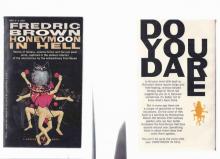 Hall of Mirrors
Hall of Mirrors Honeymoon in Hell
Honeymoon in Hell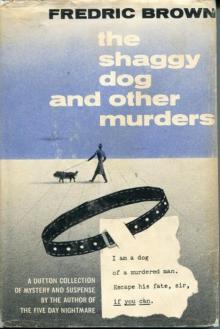 The Shaggy Dog and Other Murders
The Shaggy Dog and Other Murders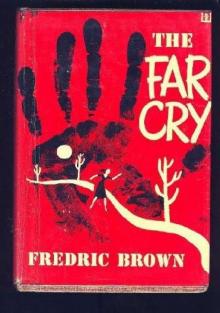 The Far Cry
The Far Cry Arena
Arena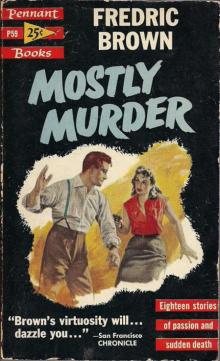 Mostly Murder
Mostly Murder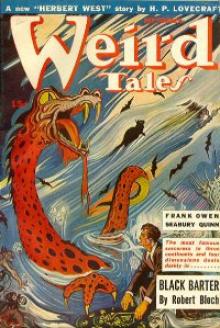 The Geezenstacks
The Geezenstacks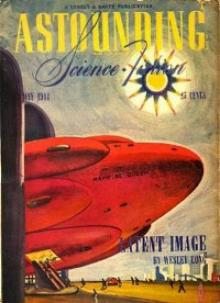 The Yehudi Principle
The Yehudi Principle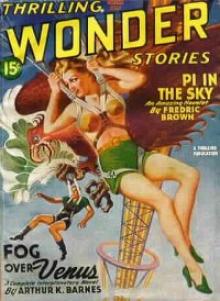 Pi in the Sky
Pi in the Sky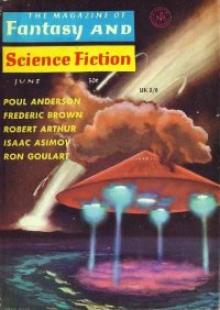 Eine Kleine Nachtmusik
Eine Kleine Nachtmusik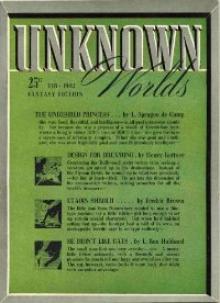 Etaoin Shrdlu
Etaoin Shrdlu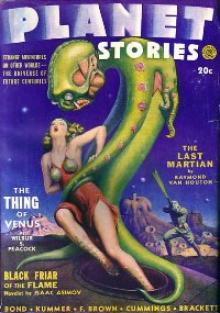 The Star Mouse
The Star Mouse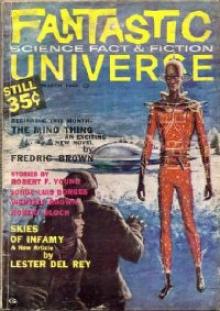 The Mind Thing
The Mind Thing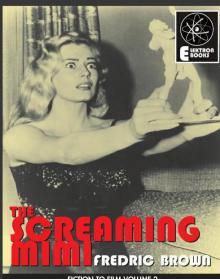 The Screaming Mimi
The Screaming Mimi The Fabulous Clipjoint
The Fabulous Clipjoint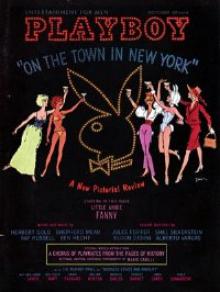 Puppet Show
Puppet Show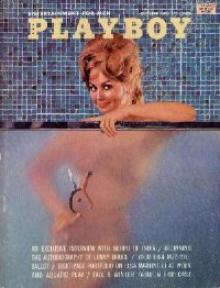 It Didn't Happen
It Didn't Happen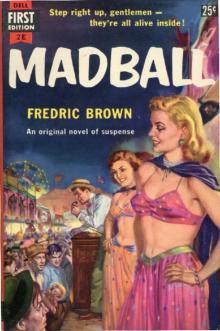 Madball
Madball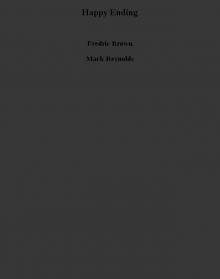 Happy Ending
Happy Ending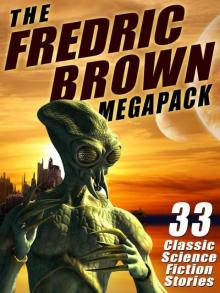 The Fredric Brown Megapack: 33 Classic Science Fiction Stories
The Fredric Brown Megapack: 33 Classic Science Fiction Stories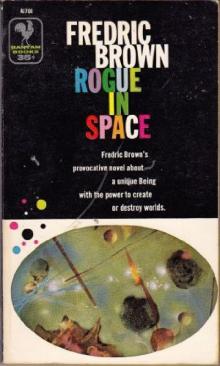 Rogue in Space
Rogue in Space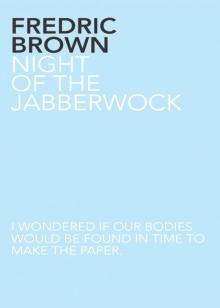 Night of the Jabberwock
Night of the Jabberwock The Dead Ringer
The Dead Ringer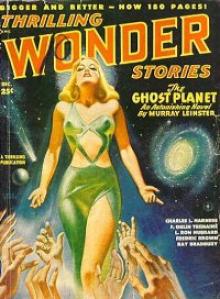 Knock
Knock We All Killed Grandma
We All Killed Grandma Space On My Hands
Space On My Hands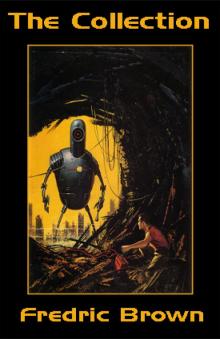 The Collection
The Collection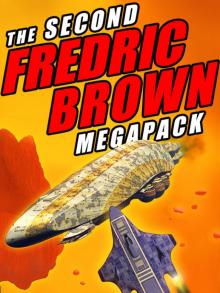 The Second Fredric Brown Megapack: 27 Classic Science Fiction Stories
The Second Fredric Brown Megapack: 27 Classic Science Fiction Stories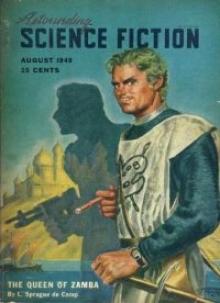 Letter to a Phoenix
Letter to a Phoenix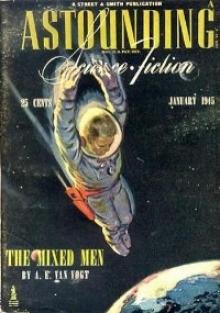 The Waveries
The Waveries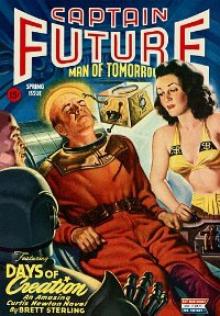 Nothing Sirius
Nothing Sirius The Deep End
The Deep End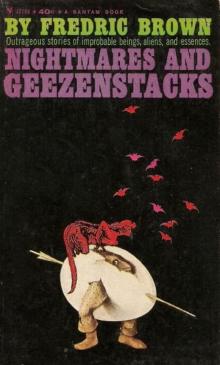 Nightmares & Geezenstacks
Nightmares & Geezenstacks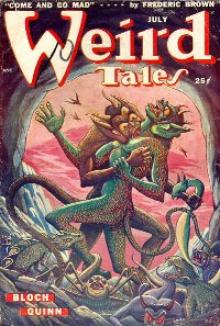 Come and Go Mad
Come and Go Mad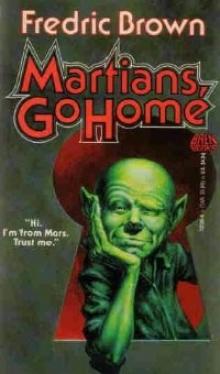 Martians, Go Home
Martians, Go Home